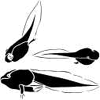• tad •
Pronunciation: tæd • Hear it!
Part of Speech: Noun
Meaning: 1. A lad or small boy. 2. A small amount, a little, sort of.
Notes: The heyday of today's Good Word was the 1950s, but it is still around. When referring to small boys, it may be pluralized (tads), but in the sense of "a little" it is usually treated like a quantifier that is the antonym of a lot, as 'a tad windy'. In Slovak a žubrienka "tadpole" is also a child, especially a young girl. In Spanish a renacuajo "tadpole" is also used to refer to a small and mischievous child.

In Play: This word has been used to refer to small boys as recently as 1983, indicating that this meaning remains current: "We were surprised to see little tads already picking on little girls at the playground." However, it is used far more frequently as the antonym of a lot: "Well, yes, I would say that melting cheese in your coffee is a tad eccentric."
Word History: The best guess is that today's Good Word was shortened from tadpole in the latter half of the 19th century and used to refer to small boys. From there it slipped into the abstract modifier it is today in the US in the 1940s, reaching the height of its popularity in the 1950s. So, I hear you asking, where did tadpole come from? Tad is a dialectal variant of toad, missing its O. Toad has no cognates in the IE languages. Pole is a variant of an old word, poll "head", borrowed from Middle Dutch pol "head, top, pate", which is also the origin of an English word for a head count, poll, as in 'poll tax'. (Let's all thank Larry Brady, Grand Panjandrum of the Alpha Agora and a tad older than a tad, from whose head sprang today's Good Word.)


